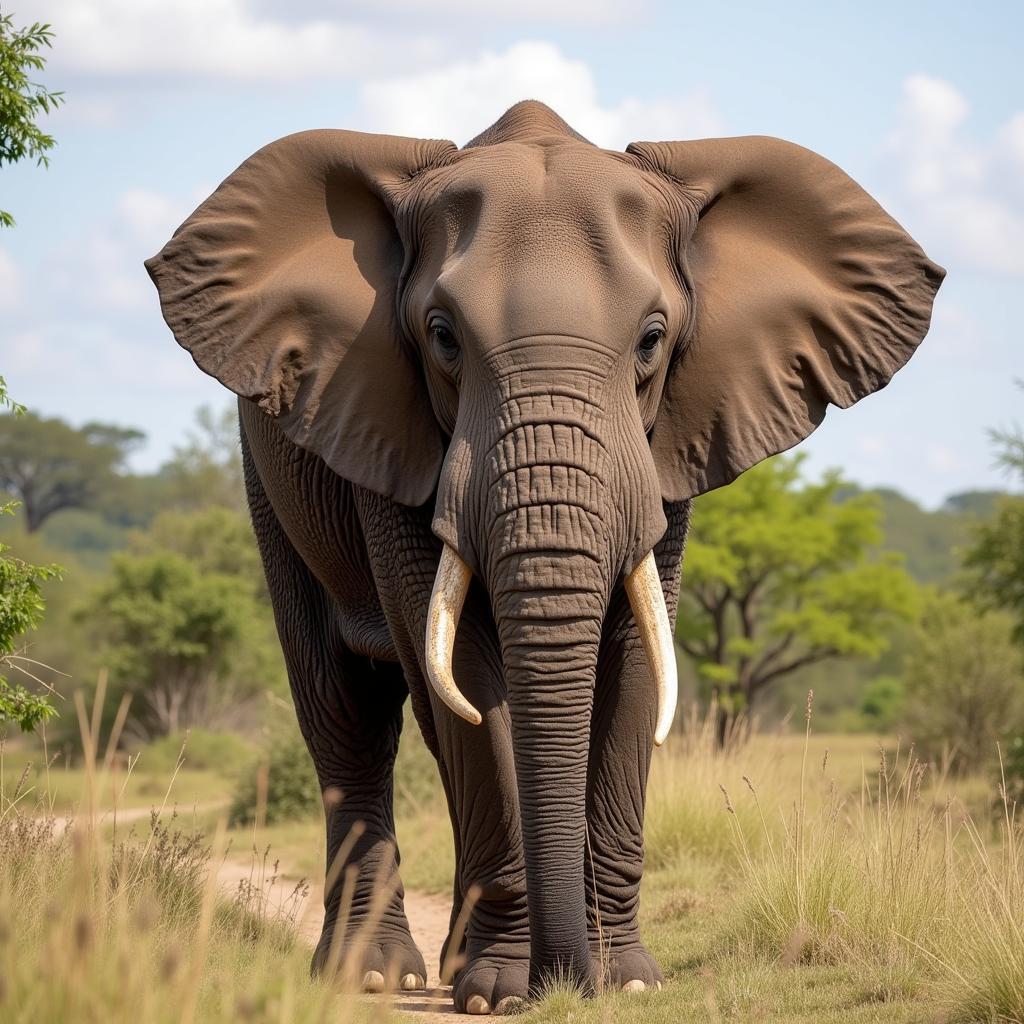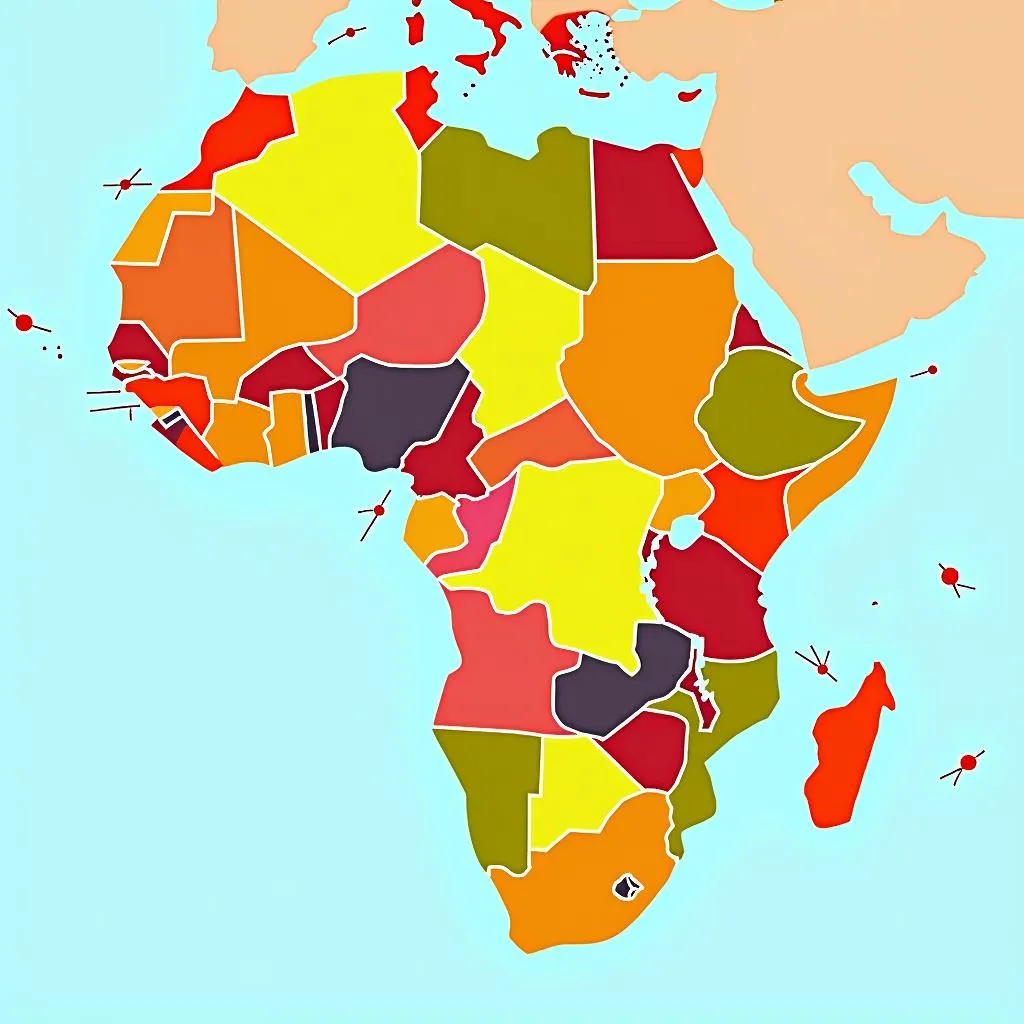African Elephant Weight Facts: Unveiling the Giants of the Savannah
African Elephant Weight Facts are truly astounding. These majestic creatures, the largest land animals on Earth, boast a weight that can rival a small truck. But just how heavy are they, and what factors influence their impressive size? Let’s delve into the world of African elephant weight, exploring the fascinating details behind their massive frames.
Unpacking African Elephant Weight: A Deep Dive
African elephants, divided into two subspecies – the savanna elephant and the forest elephant – exhibit significant differences in size and weight. The savanna elephant, the larger of the two, typically weighs between 4,000 and 7,000 kg (8,800 and 15,400 lbs) for males, and 2,700 to 3,600 kg (6,000 and 7,900 lbs) for females. Forest elephants, adapted to their denser habitat, are smaller, with males weighing around 2,700 to 6,000 kg (6,000 to 13,200 lbs) and females averaging 2,000 to 3,000 kg (4,400 to 6,600 lbs). These impressive figures highlight the sheer scale of these magnificent animals. You can find more interesting information about these gentle giants in our article on african elephant information in english.
 African Elephant Savannah Weight: A male African savanna elephant stands majestically, showcasing its impressive size and weight against the backdrop of the African savanna.
African Elephant Savannah Weight: A male African savanna elephant stands majestically, showcasing its impressive size and weight against the backdrop of the African savanna.
How Much Does an African Elephant Weigh at Birth?
Even at birth, African elephants are remarkably large. Newborn calves typically weigh between 100 and 120 kg (220 and 265 lbs), about the size of a small pony! Imagine carrying that around for 22 months! For more insights into their reproductive cycle, check out our article on african elephant pregnancy.
What Factors Influence African Elephant Weight?
Several factors influence an African elephant’s weight, including genetics, diet, age, and gender. Males are generally larger and heavier than females. Their diet, consisting of grasses, leaves, bark, and fruits, provides the necessary nutrients for growth. Age also plays a significant role, with elephants continuing to grow throughout their lives.
- Genetics: Like humans, some elephants are genetically predisposed to be larger than others.
- Diet: A healthy and plentiful diet is crucial for growth, especially during an elephant’s early years.
- Age: Elephants continue to grow and gain weight throughout their lives, reaching their peak size in adulthood.
- Gender: Males are generally significantly larger and heavier than females.
Comparing African Elephant Weight to Other Animals
To put things into perspective, an adult African savanna elephant can weigh more than seven times the weight of a white rhinoceros, another large African mammal. It’s truly a testament to their status as the largest land animals on the planet. For a look at another impressive African animal, see our article on the african buffalo head.
Why is knowing African elephant weight important?
Understanding African elephant weight facts is important for conservation efforts. Tracking weight fluctuations can indicate the health of individual elephants and the overall well-being of the population. This knowledge helps researchers and conservationists implement effective strategies to protect these magnificent creatures.
Dr. Anika Sharma, a wildlife biologist specializing in African elephants, shares her perspective: “Monitoring weight is a crucial aspect of elephant health assessment. It can provide valuable insights into their nutritional status and overall well-being, allowing us to proactively address any potential health concerns.”
African Elephant Weight: A Conservation Concern?
While weight itself isn’t a direct conservation concern, factors impacting weight, such as habitat loss and food scarcity, can significantly affect elephant populations. Understanding the relationship between weight, diet, and habitat is crucial for developing effective conservation strategies. You can explore the symbolism of the African fox in our article about what does an african fox mean. And for those interested in the artistic richness of the continent, our piece on african jewellery designs offers a fascinating exploration.
In conclusion, African elephant weight facts are a testament to the incredible scale of these remarkable animals. Understanding their weight, and the factors that influence it, plays a vital role in conservation efforts. By appreciating their immense size and the challenges they face, we can work towards a future where these gentle giants continue to roam the African landscape.
FAQ
- What is the average weight of an adult African savanna elephant?
- How does the weight of a forest elephant compare to a savanna elephant?
- How much does a baby African elephant weigh at birth?
- What are the main factors that influence an African elephant’s weight?
- Why is it important to understand African elephant weight facts for conservation?
Common Scenarios:
- Scenario 1: A tourist sees an elephant in the wild and wonders how much it weighs.
- Scenario 2: A student is researching African elephants for a school project and needs to find information about their weight.
- Scenario 3: A conservationist is monitoring the health of an elephant population and uses weight data to assess their well-being.
Related Articles:
- Are there other articles on African wildlife on this website?
- Where can I find more information on elephant conservation efforts?
Need help? Contact us 24/7: Phone: +255768904061, Email: [email protected] or visit us at Mbarali DC Mawindi, Kangaga, Tanzania.




